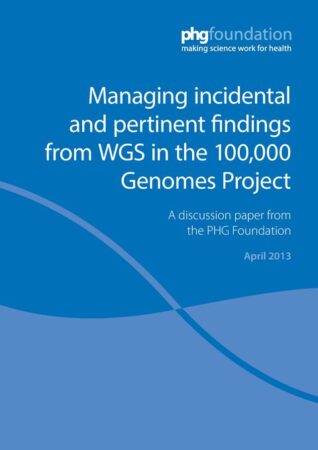Home Publications Reports Managing incidental and pertinent findings from WGS in the 100,000 Genomes Project
Managing incidental and pertinent findings from WGS in the 100,000 Genomes Project
In its discussion paper Managing incidental and pertinent findings from WGS in the 100,000 Genomes Project, the PHG Foundation sets out an ethical framework for disclosing clinical and research findings to patients/research subjects. The starting point for this framework is the need for clinicians and researchers to make a clear distinction between clinical and research elements of the project, as the ethical determinants of disclosure flow from this distinction.
The paper reviews the ethical basis for disclosing findings in clinical and research settings, and the proposed framework takes account of ethical principles, as well as the extent to which findings (pertinent or incidental) emerging from clinical or research sequencing are reasonably likely to have a clinical impact on an individual’s physical or psychological health. Key recommendations include the need to seek consent for clinical and research elements of the 100,000 Genomes Project prior to taking samples for clinical use; and to contemplate only the disclosure of those findings that are scientifically and clinically significant, and which are serious enough to warrant further clinical intervention.
By Alison Hall, Nina Hallowell and Dr Ron Zimmern

